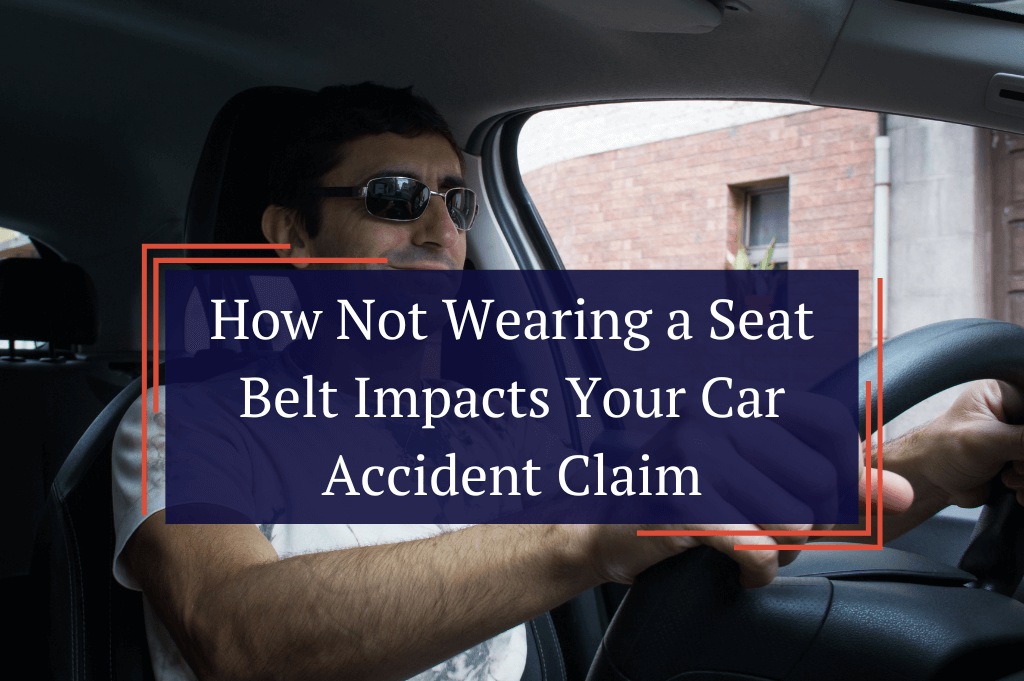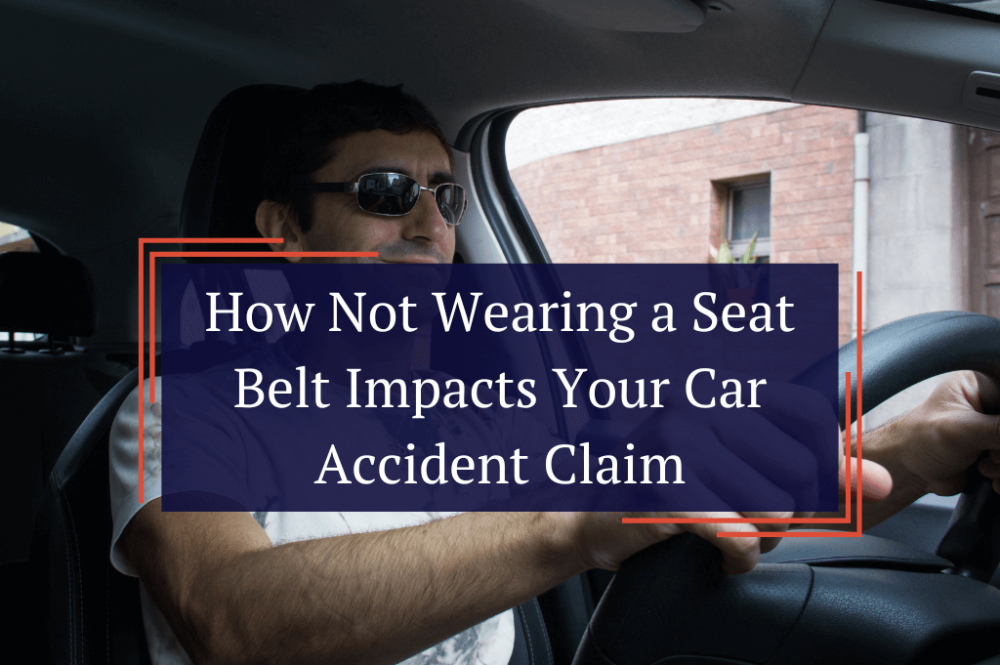- Home
- Practice Areas
- Car Accidents
- Truck Accidents
- Motorcycle Accidents
- Bus Accidents
- Drunk Driving Accidents
- No Fault & Uninsured Motorist
- Pedestrian & Bicycle Accidents
- Boating Accidents
- Dog Bites
- Swimming Pool Accidents
- Back & Spinal Cord Injuries
- Head & Brain Injuries
- Fractures, Sprains & Soft Tissue Injuries
- Passenger Injuries
- Wrongful Death
- View All
- Practice Areas
- Attorneys
- Attorneys
- About Us
- Testimonials
- Settlements
- About
- Blog
- Contact Us
How Not Wearing a Seat Belt Impacts Your Car Accident Claim



- Home
- Blog
- Passenger Injuries In Car Accidents
- How Not Wearing a Seat Belt Impacts Your Car Accident Claim
Key Takeaways:
- Michigan law requires seat belt usage, but there are some different rules, depending on the age of the passenger and where they are seated in the vehicle.
- Not wearing a seat belt can lead to serious injury.
- Neglecting to wear your seat belt does not preclude you from obtaining compensation for your injuries, but you may receive less money.
- Working with a knowledgeable and experienced law firm, like Matz Injury Law, can increase your chances of receiving the compensation you need to pay for your injuries and damages.
Seat belts are designed with your safety in mind, and in Michigan, it is a stoppable offense if you are not wearing one. Wearing a seat belt is a primary law, but if you were not wearing one at the time of an accident, this offense might not be your only concern. Insurance adjusters will look for any reason to fault you, and not wearing a seat belt may be just what they need. While this does not mean the insurance company will disregard your claim altogether, it can lead to reduced compensation. Contact Matz Injury Law for a free consultation to see how our car accident lawyers can help you.
Michigan Seat Belt Laws For All Passengers
In Michigan, seat belt laws will differ for passengers. Requirements will depend upon your age and your seat location inside the vehicle.
Back Seat Safety Laws
Michigan law stipulates passengers between the ages of eight and 15 need to be buckled up no matter where they sit inside the vehicle. Passengers 15 or older sitting in the back seat are not required to wear a seat belt, though it is strongly encouraged as wearing one may help prevent injuries in the event of an accident. Front seat passengers must always properly wear a seat belt.
Child Passenger Safety Laws
According to Michigan law, all children must ride in a car seat until they either meet the age requirement or the height requirement.
- Children four years old and younger must be in the rear seat (if vehicle has one) in a car seat
- If no rear seat or all other seats are occupied by children under four, they may ride in the front.
- Airbags must be turned off if children in rear-facing seats are seated in the front.
Children under age the age of eight or shorter than 4 feet and 9 inches tall must use a car seat or booster until they reach one of these two requirements.
What Are the Consequences of Not Wearing a Seat Belt in Michigan?

There are significant consequences for not wearing a seat belt. For one, you are more likely to suffer serious injuries in a Michigan accident. Although airbags may deploy, they are not enough to adequately protect you. It is the combination of the two, the seat belt and airbag, that garners the highest amount of safety and protection when involved in an accident.
Secondly, by failing to wear a safety belt, the occupant of a vehicle may be tossed around inside the car’s interior compartment or ejected entirely from the vehicle, which often results in a fatal injury. The National Highway Transportation Safety Administration (NHTSA) reports that in 2020 alone, 23,824 fatalities occurred, and 51% of those were of vehicle occupants wearing no seatbelt.
In addition, not wearing a seat belt by motorists is considered a misdemeanor in Michigan. Drivers and a front seat passenger must comply, while those in a rear seat can choose. All passengers between 8 and 15 years of age must wear one regardless of where they are sitting, and those younger will need to be in a car seat. Michigan’s seat belt law is specifically a primary law, which means law enforcement may stop and ticket any motorist solely for not wearing their seat belt.
How is Your Injury Compensation Affected by Not Wearing a Seat Belt?
When it comes to claiming compensation following an accident, not wearing a seat belt will be a strike against you. Insurance companies will look for any reason to reduce your settlement amount and will not hesitate to use the seat belt defense.
- Even if you were not wearing a seat belt when the crash occurred you can still file an insurance claim and receive some compensation under no-fault benefits.
- Not wearing a seat belt can make you appear negligent, even if another motorist caused the accident.
- You could receive up to 5% less compensation for your injuries if you were not wearing your seat belt.
While you may not be able to seek the maximum amount usually available in such circumstances, seeking the legal advice and representation of an experienced personal injury attorney can help you obtain all that is possible.
What Can Happen to You if You Are in a Crash and Not Wearing a Seat Belt?

The NSTSA estimates that 57% of individuals killed during accidents at night were not wearing a seat belt. If you are in an accident and neglect to wear your belt, the momentum of the car will push everything inside the car forward. An air bag’s design is to work in tandem with seat belts, not replace them to catch passenger’s forward movements.
A former emergency responder answered this question on Quora and shared two stories.
The first was a two-car accident occurring during a traffic jam at a very low speed. No damage was notable on either car, but a petite woman in the front car “had been tossed off the seat by the first impact.” She suffered a secondary impact when sitting on the car’s floor, which broke her back on the edge of the seat, paralyzing her.
A few weeks later, he was dispatched to the same highway where they found a single car driving excessive speed of over 100 mph crashed and wrapped around a utility pole. The driver suffered unconsciousness but remained in place with his seat belt. He walked out of the hospital the next day.
Related Resources
Booster Seat Laws and Requirements in Michigan: Michigan laws are specific when it comes to transporting children in motor vehicles, and it is important to follow rules for their safety.
Compensation For Death In Car Accident: Michigan Wrongful Death Guidelines: Experiencing the loss of a loved one in a car accident is devastating. Michigan law permits those left behind to pursue compensation to cover funeral and burial costs, along with lost income and other financial considerations.
Michigan Personal Injury Protection Guide: PIP coverage is a part of your own auto insurance policy designed to pay for medical bills, lost wages, transportation to and from medical appointments, and other expenses related to a personal injury.
What Should I Do If An Airbag Caused An Injury?: Airbags are designed to protect lives, but on occasion, people can become injured. By speaking with an experienced Michigan car accident attorney, you can learn your options.
Common Types of Seat Belt Injuries Caused by Accidents: Seat belts are also designed to protect lives but can sometimes lead to injuries such as scrapes and cuts, chest and shoulder injuries, seat belt syndrome, abdominal trauma, and fractures, to name a few.
Why Clients Choose Matz Injury Law
Working with a car accident attorney after an accident can make all the difference in the compensation you receive. You need someone in your corner who is knowledgeable about Michigan personal injury law and the overall settlement possibilities.
Matz Injury Law has the experience you need. Our clients know when they work with us, they can trust we’ll advocate for them while they concentrate on recovering from injuries. The attorneys at Matz Injury Law travel throughout Michigan to help our clients. We really care about you.
So much so that we will help you out for free on your mini tort case, and if you happen to get into a more serious accident later in life, think of us. Matz Injury Law takes a different approach with our 22% contingency fee. This translates to a significant difference in your final payout. Here’s a breakdown:
Scenario: You secure a $250,000 award from a truck accident case.
- Standard 33 1/3% Fee: You receive $166,667 ($250,000 – ($250,000 * 0.3333)).
- Matz Injury Law 22% Fee: You receive $195,000 ($250,000 – ($250,000 * 0.22)).
By using Matz Injury Law with a 22% fee instead of the standard 33 1/3% fee, you could save $28,333. This is a substantial amount. Settlements we have gotten for our clients include:
- $4.15 Million Settlement in Washtenaw County
- $3.45 Million Settlement In Genesee County
- $1.74 Million Settlement Awarded In Calhoun County Collision
- $1.3 Million Settlement In Monroe County
- $100,000 Uninsured Motorist Settlement In Detroit
- $500,000 Settlement in Ingham County
Testimonials
“For anyone looking for an attorney please look no further than Matz Injury Law!! Not only was Jared professional, he helped me beyond what I could have asked for. I’m so thankful for you all!!! To say I’m appreciative and grateful is an understatement. There’s no need to look for any other attorneys for you auto accidents!! They are so wonderful!!! Highly recommended 10/10!!!!!” — Tessa C.
“Skeptical of Lawyers in general, I prayed unto the Lord and asked Jesus if Matz Injury Law was in fact trustworthy. They are. God reassured me that I could put my trust in them and I did. I was not disappointed. Not only are Steve and his staff friendly, they are awesome; knowledgeable and fun to work with. I would recommend them to my friends and family. Thank you again Matz Injury Law.” — Julie K.
Wearing a Seat Belt Goes Beyond Simple Safety
Wearing a seat belt while in a vehicle is extremely important to your personal safety. It is also essential for getting the compensation you need if an accident should occur. Not wearing a seat belt can lead to significant reductions in compensation offered by insurance company adjusters, and you may find yourself financially strained should injuries or death occur.
If you or your passengers suffer injuries during a car crash, Matz Injury Law is available to help you with the claims process and will focus on obtaining the compensation you deserve. Contact our law firm today by calling 1-866-22Not33 or use the online form on our website to schedule a free consultation.
Frequent Answered Questions
Not wearing a seat belt increases your chances of sustaining an injury during a car accident. For those that survive such motor vehicle crashes, the suffering of accident injuries can be long-term and even permanent. Here are the most common injuries in an auto accident without a seat belt.
- Facial injuries
- Dental injuries
- Traumatic brain injuries
- Broken bones
Seat belts are extremely effective and reduce the risk of death for drivers or passengers (in both the front seat and back seat) in motor vehicles when involved in a crash. In 2021, the NHTSA reported that the seat belt use rate was 90.4%, potentially saving thousands of lives.
Also weighing in on this matter is the Centers for Disease Control, which states that seat belt usage can reduce the risk of dying by 45% while also cutting the risk of sustaining a serious injury by 50%. In addition, wearing a seat belt lessens the risk of being ejected from the motor vehicle during an accident.
Proper wearing of the seat belt is essential, however. The shoulder and lap belts need to secure the rib cage area, the hips, and the pelvis, allowing these areas to take the brunt of the impact.
The different types of damages that you may be able to still receive even when not wearing a seat belt in an accident include the following:
- Economic damages
- Non-economic damages
- Punitive damages
It depends. A no seat belt ticket is placed on your driving record, which your insurance company can see. They may raise your rates.
Two passengers cannot share the same seat belt. This is known as buddy buckling and is not permitted by law. Seat belts are designed for single passengers. If you are 15 and sitting in the backseat of a vehicle, you are not required by law to wear a seatbelt.
Yes, there are a few exceptions to Michigan’s seat belt laws outlined in Michigan Vehicle Code 257.710e. These include vehicles manufactured prior to Jan. 1, 1965, buses, motorcycles, mopeds, and people with written notes from physicians indicating why their patients cannot wear a seatbelt. Other exceptions include vehicles not required to be equipped with safety belts, USPS vehicles, or postal carriers using cars to deliver in rural routes.

Written By Steven Matz
Steven J. Matz is a founding shareholder of Matz Injury Law. The firm’s concentration is on personal injury litigation, with an emphasis on traumatic brain injury.
Speak To an Attorney
"*" indicates required fields







The maximum contingency fee permitted by law is actually 331/3%. Michigan court rules require that the attorney fee be computed on the net sum recovered after deducting all disbursements properly chargeable to the enforcement of the claim.
We can charge 22% while virtually all other injury attorneys charge 331/3% because we are very, very, good at obtaining results for our clients.
We do not spend millions of dollars on television ads; instead, we offer a lower fee to all our clients. We do not have dozens of lower paid associates handling our work. All our clients are represented by Steven and Jared Matz. Steven Matz started the firm in 1977 and since then has dedicated his life to representing injury victims. Jared joined the firm in 2016 but grew up listening to stories, discussing theories, and generally learning at the dinner table about how to effectively and compassionately represent injury victims. Jared Matz was literally born to represent individuals involved in motor vehicle crashes.
All of our cases are handled on a contingency fee and all our cases are handled at 22%. Whether the case settles or goes through trial, the fee does not change. While our competitors make excuses as to why they charge so much, we are obtaining results for our clients at a lower fee.
At a typical television advertising law firm, your first call will be handled by a receptionist, who may refer you to an intake person, who will discuss your claim with an intake manager, who then discusses your claim with an associate, who may then report to a partner. You may never speak with the person whose name is at the top of the letterhead. At Matz Injury Law you will always speak with either Steven Matz or Jared Matz.

© 2024 Matz Injury Law
